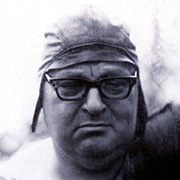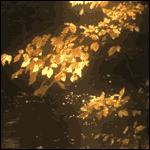|
Clark Nova posted:That was Bravest of the Lamps, pbuh Perfect, thank you! That reminds me, I do want to read Gene Wolfe.
|
|
|
|

|
| # ? Jun 5, 2024 20:15 |
|
Wolfe's the GOAT
|
|
|
|
Gaius Marius posted:Wolfe's the GOAT i admired the trolling attempt in that thread but botl's wolfe takedown was low effort, you could tell he didn't even read the books. a couple of quotes he picked at random from the first half of the first book, then he extrapolated from some posts that there's a "puzzle" (if he'd finished the books he'd know almost everything is laid out extremely explicitly in the final chapters, and most things well before that), that Severian is only a put upon hero in his own mind, etc. he didn't even pick up on the fact that he was in part reading a catholic allegory, which he fucken loved. he was always playing the game of critiquing posts and posters in the guise of critiquing art. i didn't read a lot of the stuff he posted here that ended up getting him banned but in CineD he was very often clearly writing about movies he hadn't seen.
|
|
|
|
I however did read Wolfe and he loving sucked
|
|
|
|
Well like 70 pages and then stopped because he sucked
|
|
|
|
ive only read one book by gene wolf, it was a borrowed man, wherein libraries have clone copies of dead authors with implanted memories & the protagonist is one such. which is an interesting concept, but i did not like the book at all its like it wants to be a kind of 40s hardboiled + 60s scifi pastiche, and i actually assumed it was written way back then until it mentioned the internet at some point. but it doesnt subvert or comment on those older genres at all (unless you count some vague allusions to slavery re the protagonist), it just presents a super outdated look on gender and society that made me really tired. i dont mind abhorrent narrators, it just really felt like the author was clueless but since it was short & seemed like it might go somewhere with the pseudo-homagery i finished it, and it didnt. then i mentioned somewhere on here that i didnt like it and someone got really mad at me Carthag Tuek fucked around with this message at 18:08 on Feb 9, 2024 |
|
|
|
as far as genre goes gene wolfe is good imo, though i havent read him since i got into lit, so i probably wouldnt enjoy him much now, but his book of the new sun was close enough to being an actual good book that it made me notice how trash most sci fi and fantasy actually was, and i had to start looking around for other stuff to read - then i found lit, the end.
|
|
|
|
You missed a large part of it then. Ern as part of his recloning into the library is only able to talk and act in stereotypical fashion. That's why he's brought on to help solve the case, but it also means that his words and actions can often be incongruent with his thoughts. Regardless it seems you've also missed that the woman who hired him was also a reclone, the father was trying to achieve a sort of immortality by cloning himself and his wife. Like Ern she cannot act outside of the limitations imposed upon her by her father, a man obsessed with old pulp novels. Leading to her rather stereotypical femme fatale-ish actions. There is also some heavy commentary on police brutality and repression with the implication that they simply reclone suspects and then torture them until they confess and then use that confession to arrest the suspect. Since no "actual" people are hurt it's fine. That said I found it pretty mid, Wolfe can do very good dialogue but he doesn't quite pull off the pulp dialogue which really hurts the work. Try reading Fifth Head, it has many of the same themes but is much better written for channeling Proust rather than Hammett. The second part of the work is inscrutable though.
|
|
|
|
derp posted:as far as genre goes gene wolfe is good imo, though i havent read him since i got into lit, so i probably wouldnt enjoy him much now, but his book of the new sun was close enough to being an actual good book that it made me notice how trash most sci fi and fantasy actually was, and i had to start looking around for other stuff to read - then i found lit, the end. try reading peace and see how you feel
|
|
|
|
Gaius Marius posted:You missed a large part of it then. Ern as part of his recloning into the library is only able to talk and act in stereotypical fashion. That's why he's brought on to help solve the case, but it also means that his words and actions can often be incongruent with his thoughts. Regardless it seems you've also missed that the woman who hired him was also a reclone, the father was trying to achieve a sort of immortality by cloning himself and his wife. Like Ern she cannot act outside of the limitations imposed upon her by her father, a man obsessed with old pulp novels. Leading to her rather stereotypical femme fatale-ish actions. huh! i guess i might have fallen asleep while reading* it or something lol. it was clear that his thoughts were separate from his actions and words, but i dont remember the thing about the femme fatale & being a clone at all (i assume this also means the dead brother is a clone of their "father"?). that does change my view of it somewhat, but yeah if i want to read more hardboiled, id rather re-read hammett or chandler * ebook, not audiobook. but i do often flip back a couple pages next time i pick up a book in case i thumbed ahead when falling asleep Carthag Tuek fucked around with this message at 18:43 on Feb 9, 2024 |
|
|
|
It's important to note that Wolfe has a pretty steep decline in his late period (and as an ageing conservative Catholic gets pretty Fox News poisoned)
|
|
|
|
Finally finished The Wolves of Eternity, excited to see the next one is coming out in English in October. I struggled with the second half a bit. Knausgård seemed to have some trouble finding the second main character's voice. Seems like it's harder for him to write from a woman's perspective. Or maybe that's my fault for reading his characters as projections of himself.
|
|
|
|
DeimosRising posted:(if he'd finished the books he'd know almost everything is laid out extremely explicitly in the final chapters, and most things well before that), that Severian is only a put upon hero in his own mind, etc. he didn't even pick up on the fact that he was in part reading a catholic allegory, which he fucken loved. Can someone lay out for for what I should have gathered? I have to confess it was mostly a dazed blur for me. Oh, he’s the new autarch. Cool. Green man? Ok. Now he’s back in Nessus and having somewhat cryptic conversations with people from the first book? Uh, sure. Oh hey, now we might find up what’s the deal with that Valeria - oh, it’s over now.
|
|
|
|
hannah posted:just wanna ask; what’s the pacing of Against the Day, and Gravity’s Rainbow? Haven't read Against the Day but for the pacing Gravity's Rainbow I'd say it's, "real good." Also, Gravity's Rainbow is being about the centre of the universe, imho ulvir posted:i started with Stoner today, its decent enough. realism is a good change of pace after a whole bunch of Fosse, Bolaño etc the last few months I haven't read the last of Septology, and I looked at the wikipedia article to remind me what realism is—got as far as 'Broadly defined as "the representation of reality"' then got bored and wanted to make my ill-informed post—but Fosse seems to represent Asle's reality real well. *** Also, John Banville rocks, from a short Graun interview... quote:How has literary culture changed since you started out in the 1970s? And from his Wikipedia page, 'He advises against young writers approaching him for advice: "I remind them as gently as I can, that they are on their own, with no help available anywhere"' Although I went to a reading and Q&A he did a few years back at my old university. He read from his new book and it was dull as poo poo. Maybe it doesn't work read aloud (I find most don't, certainly not at author readings, which are typically awful events unless they're held in a bar) or maybe his reading of his own work was just bad. I didn't get anything much from the Q&A either. It seemed like he loved talking but deep down was going through motions (which is fair.) I had no desire to read his work, but having read this now tonight I do, so if anyone has recommendation... Final quote from his Wiki page... quote:Beginning with Christine Falls, published in 2006, Banville has written crime fiction under the pen name Benjamin Black.[23] He writes his Benjamin Black crime fiction much more quickly than he composes his literary novels.[24] He appreciates his work as Black as a craft, while as Banville he is an artist. He considers crime writing, in his own words, as being "cheap fiction".[25] Someone invite him to the forums. Also, I agree, writing schlock is a lot easier than writing art, and also more fun. Final point from me about the much earlier talking about fiction without quotes being pretentious/whatever. I feel like there's fairly crappy authors who understand now it'll add literary weight to their rubbish and get them praise for making "art." I pulled this thought mostly from my rear end but also from reading Goodread reviews of a book.
|
|
|
|
Who's read author biographies? People gush about Joseph Frank's Dostoevsky five-parter, and I have my eye on ones for Dickens and Steinbeck.
|
|
|
|
I tried 'My wars are laid away in books' when I went through my Emily Dickenson phase but it was super long and boring. I got over 250 pages in before I gave up. I haven't tried any biographies after that. Maybe it was because she spent her entire life as a hermit. I bet a Hemingway or Steinbeck one would be more fun. https://www.amazon.com/Wars-Are-Laid-Away-Books/dp/0679449868?ref=d6k_applink_bb_dls&dplnkId=1c17dbc7-40c0-484f-a8ac-f2fd71356db5 davey4283 fucked around with this message at 09:18 on Feb 10, 2024 |
|
|
|
Last year I had the urge to get back into reading 'real literature' after several years of reading almost exclusively non-fiction books. I have two young children which makes it difficult to find any consistent, quiet reading time, which really discouraged me from getting stuck into any long, dense novels. So I decided to buy the Penguin Little Black Classics box-set, because each of the books are only ~50 pages long, and I thought it would be a great chance to expose myself to authors I've never read before without needing to invest too much of my (rare) free-time. I finished the last of the 80 books last week, and I can really recommend it as a great option for anyone who's looking to get into 'real literature' without knowing where to begin. There are many books here that I can't say that I 'enjoyed', but I'm still grateful that it exposed me to literature that I would otherwise never be motivated to read. There's a good mix of genres here (short stories, poetry, philosophy, plays, memoirs, religious texts, etc.) from a good mix of cultural backgrounds (even if it is inevitably biased towards 'the dead white dudes' demographic somewhat). Before I read each book, I always read up on the background of each author to understand their context a little bit, which helped me to appreciate what I was reading, even if - as I said - I didn't always 'enjoy' it per se. It's expanded my horizon a lot, and motivated me to seek out other classic literature that might otherwise have flown under my radar. Some highlights: #11 - A Cup of Sake Beneath the Cherry Trees by Yoshida Kenkō: If you'd told me before the fact that I'd connect with a book written by a 14th century Japanese monk then I probably would have laughed at you, but this was a really enjoyable read. It reminded me a lot of 'The Book of Disquiet' by Fernando Pessoa - one of my favourite books of all times - in that it consists mainly of idle musings which never attempt to cohere into anything grander or more systematic. The title captures the passive, reflective mood of the book perfectly. #14 - Woman Much Missed by Thomas Hardy: I had read very little poetry in my life before this collection, and never read Thomas Hardy at all, but this was a brilliant collection. It's essentially a series of poems dedicated to the memory of Hardy's dead wife, and it manages to be touching without ever becoming overly maudlin or saccharine. In fact, there's a kind of stark, brutal honesty to a lot of it, where he never attempts to paint his wife or his relationship with her as being at all idyllic (this is where knowing the background of the work helps a lot - he apparently had a very complicated, almost toxic relationship with his wife before she died) but instead ruminates on simple things like how he misses her pottering around the garden, and how he regrets not addressing her sadness and alienation while she was alive. 'We Sat at the Window' is a good example of what's to be found here: quote:We sat at the window looking out, #42 - The Yellow Wall-Paper by Charlotte Perkins Gilman: A largely autobiographical short story about a woman's experience with post-partum depression and her slow descent into madness. It does a very good job of relaying both what it is like to undergo such an episode, as well as how cruel and ignorant the surrounding world could be about such matters. A very brave and honest account of the suffering and alienation many new mothers are expected to bear, particularly given the far less enlightened time (with respect to both women's issues and mental health) in which it was written (1893). #45 - A Simple Heart by Gustave Flaubert: A short story about the entire adult life of a live-in nanny / servant to an unhappy, crumbling family. I've read that Flaubert's prose is some of the greatest and most influential ever put to paper, and while I didn't get much sense of that here (it's difficult to know how much is lost in translation, or how good this particular translation is), it's still a very touching story of a woman whose entire life is given over to the service of others without any particular expectation that she should ever be entitled to anything greater. She dotes on the children and is broken when they leave the house, and the description of her idiosyncratic Catholic practices towards the end of the narrative (where she begins to conflate the Holy Spirit with her pet parrot) is perhaps the most sympathetic portrayal of religious devotion that I've ever read. #55 - Antigone by Sophocles: One of the first plays I've read since high-school, and certainly the first ancient Greek play I've ever read, but it won't be the last. It does any amazing job of conveying, in a realistic but still lyrical manner, the complex psychologies of all of the characters involved, despite the conventional limitations of the genre. My only regret is not having read the two earlier plays in this 'Theban' cycle (Oedipus Rex and Oedipus at Colonus) first. #60 - The Old Man of the Moon by Shen Fu: A selection taken from the larger work 'Six Fragments of a Floating Life' which focus primarily on the author's relationship with his wife, from the moment they first met to the time of her death. It's a fairly starkly down-to-earth and honest account of Chinese peasant life from the early 19th century, and for that reason the author manages to stay relatable and sympathetic even at those times where you sense the greatest degree of cultural and historical separation from him (e.g. the times that he leaves his ailing wife behind for weeks at a time, or when they go out looking for a concubine to bring into their relationship). It ends up being a very touching and insightful narrative. In hindsight, I wish I had just read the 'Six Fragments' in its totality, though, because this edition already appears to comprise about half of the original work. And some lowlights while I'm here: #12 - How to Use Your Enemies by Baltasar Gracián: Imagine Jordan Peterson meets Machiavelli. I obviously don't intend that as a compliment. Just a really dismal, shallow and cynical view of human life with nothing to commend it. #21 - Trimalchio's Feast by Petronius: An excerpt from his 'Satyricon'. I'm sure this had them rolling in the aisles back in 80 BC, but it's incredibly repetitive and obscure by today's standards. Are you the kind of person who finds the pretentions of the ancient Roman nouveau riche and the kinds of cuisine they serve to be particularly humourous? If not, stay away, because it doesn't offer much else besides that for 50 pages. #30 - The Terrors of the Night by Thomas Nashe: One of those entries where you can only wonder why the editors of the series thought it was worth including. Ostensibly it's an essay about the nature of evil spirits, but it's so rambling and disjointed, and the prose is so stiff and stilted in the manner of most Elizabethan English (this was written in 1594), that it's basically unreadable. Even if you can get past the style, the content is dry and obscure. Talking about evil spirits and demons - whether with a skeptical eye or a credulous eye - has the potential to be a lot of fun, but nothing about this is fun in the slightest. I'm just not sure what sort of audience they included this for. #51 - My Dearest Father by Wolfgang Amadeus Mozart: A series of letters between Mozart and his father which are incredibly tedious and unenlightening, most of them concerning either money or travel arrangements. It does provide a decent 'wtf' moment, though, when Mozart's mother dies while on tour with him, and he doesn't bother to tell his father about it until like two weeks later, pretending she's merely 'sick' in the meantime. #76 - O Cruel Alexis by Virgil: Excerpts from the Eclogues and the Georgics. The prose here is really dense, starchy and unappealing (which might be a translation issue) and riddled with obscure references to ancient Roman myths, people and places. Plus I've always found romanticism for the rustic life to be incredibly grating anyway. I've been meaning to read the Aenid for a while, and this didn't do much to inspire me. With that box-set out of the way, I'm now getting started on the Penguin Modern box-set, which contains 50 books which are once more ~50 pages in length, but from more modern writers. I look forward to reporting back on that too once I'm done!
|
|
|
|
I have the penguin modern set. They fit in a pocket as easily as a phone, which is why I got it.
|
|
|
|
Blurred posted:Penguin Little Black Classics This was a really interesting post, thank you! I'll definitely have to check out some of these
|
|
|
|
I’m reading A Girl Is a Half-formed Thing and I think this McBride lady is going places, she can spin quite a yarn
|
|
|
|
That is really interesting, I've never seen this collection before. I'm also on a big novella kick. I just got Steinbeck's collection on my Kindle and I really enjoy the way you can fly right through those shorter stories. It's the best of both worlds, you get the feel of classic lit without the commitment as you mentioned in your post. I'll have to see if there is a digital version of this floating around somewhere out on the high seas.
|
|
|
|
Read Some Real Literature: Abridged Edition
|
|
|
|
|
From what I remember A Simple Heart was written largely because people found Flaubert's previous works, especially regarding women, as far too mean spirited and cynical. So he set out to create the story of the anti-Bovary. His prose really shines in concert with his cynical and dry humor so it doesn't surprise me that Sentimental Education or Bovary are more eloquent.
|
|
|
|
Bilirubin posted:Read Some Real Literature: Abridged Edition tbf only some of those are abridged, a lot are just shorter works. Blurred posted:Last year I had the urge to get back into reading 'real literature' after several years of reading almost exclusively non-fiction books. I have two young children which makes it difficult to find any consistent, quiet reading time, which really discouraged me from getting stuck into any long, dense novels. So I decided to buy the Penguin Little Black Classics box-set, because each of the books are only ~50 pages long, and I thought it would be a great chance to expose myself to authors I've never read before without needing to invest too much of my (rare) free-time. What did you think of the book of Tang dynasty poetry? I assume the four poets are Li Bo, Du Fu, Wang Wei, and...maybe Yishan?
|
|
|
|
DeimosRising posted:tbf only some of those are abridged, a lot are just shorter works. It was only three poets, and yeah it's the first three you mentioned. I remember enjoying it, but it's difficult for me to cast any meaningful judgement it because I don't really have any frame of reference to measure it against - this was my first time reading Chinese poetry, ancient or modern. There's a good mix of styles in it - some poems are more lyrical, others are more prose-like; some are impressionistic sketches of nature, others are more narrative-driven, etc. - but I remember finding the content and imagery of the poems to be very stereotyped. Everything was autumn breezes, cherry blossoms and flowing streams. Maybe that's just a function of the genre at the time, though - like I said, it's difficult for me to judge. A lot of the more narrative-driven poems seemed to be about men leaving their families to go to war for some reason, but I'm not sure if that's because it was a typical subject for poets at the time, or if it's just an editorial decision made by the collators. The poem written by Li Bo from the perspective of a soldier to his children sticks in my head for being particularly touching. So yeah, I can definitely recommend it to someone who just wants a brief exposure to ancient Chinese poetry to see what the lay of the land like (that's what this series is best for) but hardcore ancient Chinese poetry fans would obviously want something more substantial than the 30 or so pieces here. Blurred fucked around with this message at 09:29 on Feb 12, 2024 |
|
|
|
Does "A Universal History of Iniquity" only contain the one story that originates from Borges himself? The stories from the 1001 Nights certainly feel as if they were his full creations.
|
|
|
|
Blurred posted:It was only three poets, and yeah it's the first three you mentioned. I remember enjoying it, but it's difficult for me to cast any meaningful judgement it because I don't really have any frame of reference to measure it against - this was my first time reading Chinese poetry, ancient or modern. There's a good mix of styles in it - some poems are more lyrical, others are more prose-like; some are impressionistic sketches of nature, others are more narrative-driven, etc. - but I remember finding the content and imagery of the poems to be very stereotyped. Everything was autumn breezes, cherry blossoms and flowing streams. Maybe that's just a function of the genre at the time, though - like I said, it's difficult for me to judge. A lot of the more narrative-driven poems seemed to be about men leaving their families to go to war for some reason, but I'm not sure if that's because it was a typical subject for poets at the time, or if it's just an editorial decision made by the collators. The poem written by Li Bo from the perspective of a soldier to his children sticks in my head for being particularly touching. Li Bo and Du Fu lived during the An Lushan rebellion, a war so devastating that China's population dropped to 1/3 its pre war level from a combination of war deaths, starvation, and mass migration of refugees out of the area controlled by the Tang dynasty. It was on their minds a lot
|
|
|
|
Read Augustus and there's a part near the end where the author just drops that homosexuality is bad actually. Stuck out to me as very not in-character for a Roman emperor, who rather famously enjoyed loving men. Otherwise it's basically Stoner but he's emperor instead of a lovely prof.
|
|
|
|
I know I said I was going to start 2666 but that was so one page ago (and I didn't bring it to work) now I'm reading Thieves by Mishima
|
|
|
|
whomstn't amongst us
|
|
|
|
Puppy Burner posted:Read Augustus and there's a part near the end where the author just drops that homosexuality is bad actually. Stuck out to me as very not in-character for a Roman emperor, who rather famously enjoyed loving men. Otherwise it's basically Stoner but he's emperor instead of a lovely prof. Augustus was very into promoting family values and gave tax breaks for having lots of kids and stuff
|
|
|
|
Puppy Burner posted:Read Augustus and there's a part near the end where the author just drops that homosexuality is bad actually. Stuck out to me as very not in-character for a Roman emperor, who rather famously enjoyed loving men. Otherwise it's basically Stoner but he's emperor instead of a lovely prof. Yeah when I think Gay Emperor I'm definitely thinking Augustus. Perhaps some background reading before your next delve into historical psuedo-biography.
|
|
|
|
wiki posted:Homoerotic themes occur throughout the works of poets writing during the reign of Augustus, including elegies by Tibullus[35] and Propertius,[36] several Eclogues of Vergil, especially the second, and some poems by Horace. In the Aeneid, Vergil—who, according to a biography written by Suetonius, had a marked sexual preference for boys[37][38]—draws on the Greek tradition of pederasty in a military setting by portraying the love between Nisus and Euryalus,[39] whose military valor marks them as solidly Roman men (viri).[40] Vergil describes their love as pius, linking it to the supreme virtue of pietas as possessed by the hero Aeneas himself, and endorsing it as "honorable, dignified and connected to central Roman values".[41] And his famous laws, that he definitely obeyed and were not for show, against incest (lol), adultery (lol), prostitution, and homosexuality. He was not gay (arguably the term doesn't even apply in the historical context) but gay sex was very in fashion during his reign and among his class so it seems likely to me that he indulged. I'm more familiar with Vergil, Ovid and Horace than detailed Roman history though so if there's some definitive source of Augustine heterosexuality, mea culpa I guess. Edit: for context the gay sex inferior part is in reference to Ovid's Art of Love, but changed Augustus, page 309ish posted:To that instant of pleasure some dedicate all their lives, and become embittered and empty when the body fails, as the body must. They are embittered and empty because they have known only the pleasure, and do not know what that pleasure has meant. For contrary to what we may believe, erotic love is the most unselfish of all the varieties; it seeks to become one with another, and hence to escape the self. This kind of love is the first to die, of course, failing as the body that carries it fails; and for that reason, no doubt, it has been thought by many to be the basest of the varieties. But the fact that it will die, and that we know it will die, makes it more precious; and once we have known it, we are no longer irretrievably trapped and exiled within the self. It stuck out to me. Puppy Burner fucked around with this message at 02:39 on Feb 13, 2024 |
|
|
|
I am deeply annoyed finally reading Knausgaard to discover he really is as good as the universal praise offers him
|
|
|
|
I get that some horrible keyboards don't have an Å-key but what's up with the "aa"?
|
|
|
|
3D Megadoodoo posted:I get that some horrible keyboards don't have an Å-key but what's up with the "aa"? That's how it's written on the cover of the book.
|
|
|
|
Puppy Burner posted:And his famous laws, that he definitely obeyed and were not for show, against incest (lol), adultery (lol), prostitution, and homosexuality. He was not gay (arguably the term doesn't even apply in the historical context) but gay sex was very in fashion during his reign and among his class so it seems likely to me that he indulged. I'm more familiar with Vergil, Ovid and Horace than detailed Roman history though so if there's some definitive source of Augustine heterosexuality, mea culpa I guess. I don't really know what to say since you're discussing some fairly oblique musings in a work of fiction, but certainly Augustus as a conservative heterosexual voice makes more historical sense than that all Roman men had sex with men and so he should too.
|
|
|
|
Mel Mudkiper posted:I am deeply annoyed finally reading Knausgaard to discover he really is as good as the universal praise offers him Which one ya reading? Tbh idk if I'd be able to get into My Struggle as much as I've enjoyed his straight-up fiction. I gotta give it a try. So far Mishima's Thieves is not that great. Or at least not up my alley. Maybe it's the translation. It's all kind of sweeping narration without like sticking into a scene with dialogue or whatever. Some cool moments and it's short so I'll see it through.
|
|
|
|
3D Megadoodoo posted:I get that some horrible keyboards don't have an Å-key but what's up with the "aa"? thats how we transcribe the sound in English
|
|
|
|

|
| # ? Jun 5, 2024 20:15 |
|
apophenium posted:Which one ya reading? The Morning Star apophenium posted:So far Mishima's Thieves is not that great. Or at least not up my alley. Maybe it's the translation. It's all kind of sweeping narration without like sticking into a scene with dialogue or whatever. Some cool moments and it's short so I'll see it through. I dont even know Thieves which is weird because I thought I knew all the Mishima
|
|
|





























